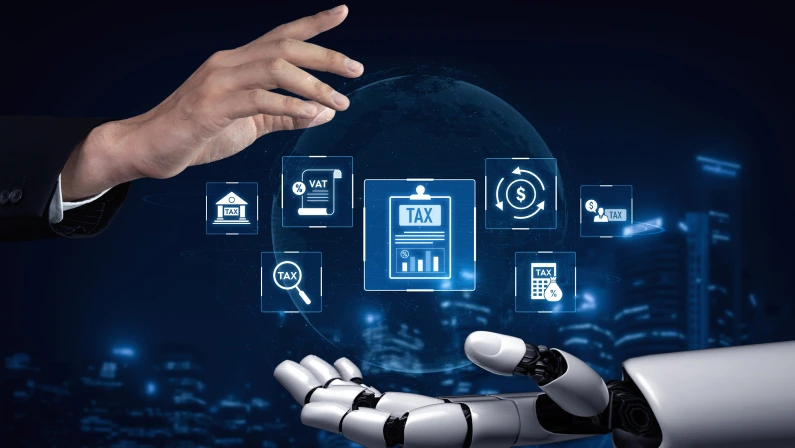
Artificial intelligence (AI) is no longer a futuristic concept but a powerful force driving transformation across industries. Accounting is no exception. As financial data grows more complex and the demand for real-time insights rises, AI is helping accountants and finance professionals handle tasks faster, smarter, and with greater accuracy than ever before.
The use of AI for finance and accounting is redefining how professionals approach bookkeeping, auditing, tax preparation, and financial forecasting. From automating repetitive tasks to detecting fraud and improving decision-making, AI technologies are making accounting more efficient and data-driven.
What Is AI in Accounting?
Before exploring its applications, it’s important to understand ‘what is artificial intelligence in accounting’. It refers to the use of machine learning, data analytics, and automation tools to perform tasks traditionally done by humans, such as transaction categorization, expense tracking, and audit analysis. By learning patterns from vast datasets, AI systems can detect anomalies, generate reports, and even forecast financial outcomes.
In essence, AI for finance and accounting allows professionals to focus on high-value strategic work instead of spending hours on data entry or reconciliation.
How Is AI Used in Accounting Today?
How can AI help accountants? Artificial intelligence is now integrated into many everyday accounting processes.
Here are a few key examples of artificial intelligence in accounting and how they are reshaping the industry:
Automating Data Entry and Bookkeeping
AI software can read invoices, receipts, and bank statements, then automatically enter them into accounting systems. This reduces manual workload and minimizes human error.
Streamlining Expense Management
Using AI for accounting helps firms manage expenses more efficiently. Algorithms can categorize expenses, match transactions with receipts, and flag unusual spending patterns.
Enhancing Financial Forecasting
AI analyzes past financial data and current trends to generate predictive insights, helping finance teams make informed budgeting and investment decisions.
Improving Audit Accuracy
Through intelligent algorithms, auditors can review large volumes of data quickly and pinpoint irregularities or potential compliance issues.
Can AI Replace Accountants or Just Assist Them?
While AI can automate many accounting tasks, it cannot replace the judgment, ethics, and strategic insight of human accountants. Instead, it serves as a powerful assistant—helping professionals save time, reduce risk, and focus on analysis and client advisory services. AI for accounting firms is most effective when paired with human expertise, ensuring both precision and context in financial decision-making.
What Are the Benefits of Artificial Intelligence in Accounting?

Artificial intelligence offers a wide range of advantages that go beyond automating routine tasks. By integrating AI into accounting processes, firms can boost productivity, improve decision-making, and enhance accuracy across all financial operations.
Increased Productivity
AI accelerates data processing, allowing accountants to handle larger workloads in less time.
Greater Accuracy
Machine learning models reduce human error by ensuring transactions and records are consistent and compliant.
Real-Time Insights
AI systems can generate live dashboards and forecasts, providing up-to-date insights into financial performance.
Cost Savings
Automation lowers operational costs by reducing the time and resources needed for manual accounting tasks.
What Are the Challenges of Implementing AI in Accounting?
While the advantages of AI in accounting are significant, adopting this technology also comes with its share of challenges.
High Initial Costs
Integrating AI solutions can be expensive due to software, infrastructure, and training needs.
Data Security Concerns
Since accounting involves sensitive information, protecting data from breaches and misuse is a major concern.
Change Management
Some professionals may resist adopting AI tools due to fear of job loss or lack of familiarity with the technology.
How Does AI Improve Accuracy and Efficiency in Accounting Processes?
AI has become a valuable tool for improving precision and streamlining workflows in accounting. Automating data handling and continuously monitoring financial activities minimizes errors and saves valuable time.
Automated Reconciliations
AI tools can instantly match transactions with invoices and receipts, ensuring accuracy and eliminating discrepancies.
Continuous Monitoring
AI systems monitor financial data in real time, identifying errors before they escalate into bigger problems.
Smart Error Detection
By learning from previous mistakes, AI platforms can predict and prevent common accounting errors.
How Is AI Transforming Auditing and Fraud Detection?
Auditing and fraud detection have always required careful analysis and attention to detail. With AI, these processes are becoming faster, smarter, and more reliable.
Advanced Risk Assessment
AI algorithms can analyze historical audit data to identify high-risk areas and allocate resources effectively.
Pattern Recognition
AI for finance and accounting can recognize unusual transaction patterns that may indicate fraud.
Predictive Fraud Analytics
Using predictive models, AI can flag potential fraudulent activity before it causes financial damage.
How Can Small and Medium Accounting Firms Benefit from AI?
AI is no longer reserved for large corporations—small and medium accounting firms can now access powerful tools that streamline operations and improve client services.
Affordable Automation
Cloud-based AI for accounting firms allows smaller businesses to automate without high overhead costs.
Scalable Solutions
Firms can use AI tools that grow with their client base, ensuring long-term efficiency.
Competitive Advantage
AI-driven insights enable smaller firms to offer data-based financial advice and stay competitive with larger organizations.
A great example is Leapify, a marketing and technology solutions provider that helps businesses, including accounting firms, integrate intelligent systems for better performance. With smart AI tools and digital strategies, Leapify empowers professionals to streamline operations and enhance client relationships.
How to Get Started With Accounting Intelligence

Integrating AI into accounting doesn’t have to be overwhelming. With the right approach, firms can gradually introduce intelligent tools that enhance efficiency and accuracy.
Assess Current Processes
Identify repetitive or time-consuming tasks that AI can automate, such as bookkeeping or report generation.
Choose the Right Software
Look for platforms with strong data security, user-friendly dashboards, and reliable support.
Train Your Team
Accountants should learn how to interpret AI insights and use data analytics tools effectively.
Start Small and Scale Gradually
Begin with a pilot project to understand how AI fits within your firm’s workflow before expanding its use.
What Is the Future of AI in Accounting?
The future of AI in accounting is focused on continuous learning, automation, and strategic decision-making. As technology evolves, accountants will move from data entry roles to becoming financial strategists who interpret AI-driven insights. More advanced natural language processing and predictive analytics will also allow accounting systems to deliver personalized financial recommendations.
What Skills Will Accountants Need in an AI-Driven Future?
As AI continues to reshape the accounting landscape, the role of accountants is evolving from data processors to strategic advisors.
Data Analytics Expertise
Accountants will need to understand how to interpret and apply data-driven insights.
Technological Proficiency
Familiarity with AI tools, cloud computing, and digital platforms will be essential.
Strategic Thinking
Professionals must shift from reactive to proactive roles, using AI insights to shape financial strategies.
Ethical Judgment
As automation increases, maintaining ethical oversight in financial reporting and auditing remains crucial.
Embracing the AI Revolution in Accounting

Artificial intelligence is not just transforming how accountants work—it’s redefining what’s possible in the profession. By automating repetitive tasks, improving accuracy, and offering predictive insights, AI is paving the way for smarter, more efficient accounting practices.
To make the most of this transformation, firms need an AI platform for accountants that integrates seamlessly with their workflows and enhances productivity. Using platforms like Leapify can help accounting professionals harness the full potential of AI, ensuring they stay ahead of the curve in a rapidly evolving digital landscape. Contact us today!



